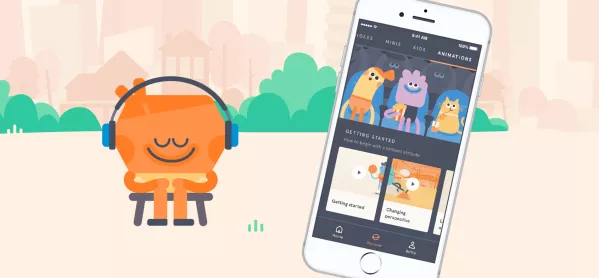- Home
- Do mindfulness apps work for teachers?
Do mindfulness apps work for teachers?

A teacher’s job shouldn’t be stressful. Great holidays, rewarding, well paid.
And yet it is stressful. Really stressful.
According to the Education Support Partnership, teachers’ stress levels are at an all-time high, and not only that, teachers are more stressed than people in other professions.
But what can be done to change that? Some believe that mindfulness apps might be the answer.
Mindfulness apps
Mindfulness is certainly becoming popular in education. Earlier this year, Tes investigated how effectively schools were implementing mindfulness programmes for teachers, and also reported on the rise of mindfulness retreats designed for teachers.
But it is apps where the attention has recently shifted, in part due to the decision of the Headspace mindfulness app to give teachers free subscriptions.
Headspace announced it was offering teachers in the UK, US, Canada and Australia a year’s free subscription to its service to assist them in their pursuit of a less stressful and more mindful life. It’s not an entirely altruistic offer - such a move quickly builds its user base - but it has proved popular with educators on social media.
Lauryn Nwankpa, head of social impact at Headspace, believes the app can help give teachers the guidance they need to bring mindfulness in their lives.
“Our validated approach to educator support recognises that educators need tangible tools and resources to foster mindfulness in their classroom environments,” she says.
And she suggests that if you help a teacher, you’re also going to have a positive impact on the children they teach.
“Our theory is that if we can help educators build resilience, improve sleep quality, mitigate stress and foster mindfulness in their classrooms - the impact on the next generation will be immeasurable,” she says.
‘Appy days?
So how does it actually work? Like all Mindfulness apps - another popular app is Calm - Headspace is designed to teach a person how to meditate via guided videos. Each video varies in length and focus in order to suit the different lifestyle needs of the user. Sounds simple enough? All these apps use simplicity and ease of use as a selling point.
But what does the science say about mindfulness being delivered through apps? Is it really possible to reduce teacher stress simply through an app you can fire up whenever you feel a bit overwhelmed?
Dr Darren Moore, a lecturer at Exeter University, says that it all comes down to how the teachers use it as to whether it can actually make a difference.
“If we gave 10 teachers the app on their phone, there’s going to be variation in how they use it. Some might never open it, some might find that meditation really isn’t for them, others are likely to find the app very helpful for a range of areas of work and beyond,” he explains.
Meanwhile, Richard Burnett, co-founder of the Mindfulness in Schools Project, cautions teachers about seeing the app as a replacement for mindfulness instruction when it comes to introducing mindfulness to their classes.
“Headspace is a great introduction to mindfulness...and the benefits of mindfulness are well researched, and can positively impact staff wellbeing.
“My only concern would be if teachers began to use Headspace as a way of teaching children in the classroom. Teachers need to be properly trained to deliver mindfulness techniques to children and young people, ensuring proper safeguarding procedures are in place. There is no substitute for face-to-face guidance by trained adults.”
Normalising teacher stress?
The potential risk of apps like these is that they may normalise the idea that teaching is an inherently a stressful profession. But Willem Kuyken, director of the University of Oxford Mindfulness Centre, says that should not be the case.
“The suggestion that the offer of mindfulness apps normalises stress implies that these apps are designed primarily to cope with stress,” says Kuyken.
“Yes, many people turn to them to help them manage stress, anxiety and sleep problems, but the purpose of mindfulness is in a way more fundamental than that.”
He continues: “Mindfulness can be used to help people understand and train their minds so they can better navigate the world, in ways aligned with their values, with a sense of clarity and ease. For teachers, whose lives can be quite frantic, this is important.”
Whether the apps will work, then, is dependent on a lot of variables. But whatever your view, the decision by Headspace to offer teachers the app for free should be a wake up call for the profession that teacher stress is now so prevalent it has become a very attractive business opportunity.
Keep reading for just £1 per month
You've reached your limit of free articles this month. Subscribe for £1 per month for three months and get:
- Unlimited access to all Tes magazine content
- Exclusive subscriber-only stories
- Award-winning email newsletters



